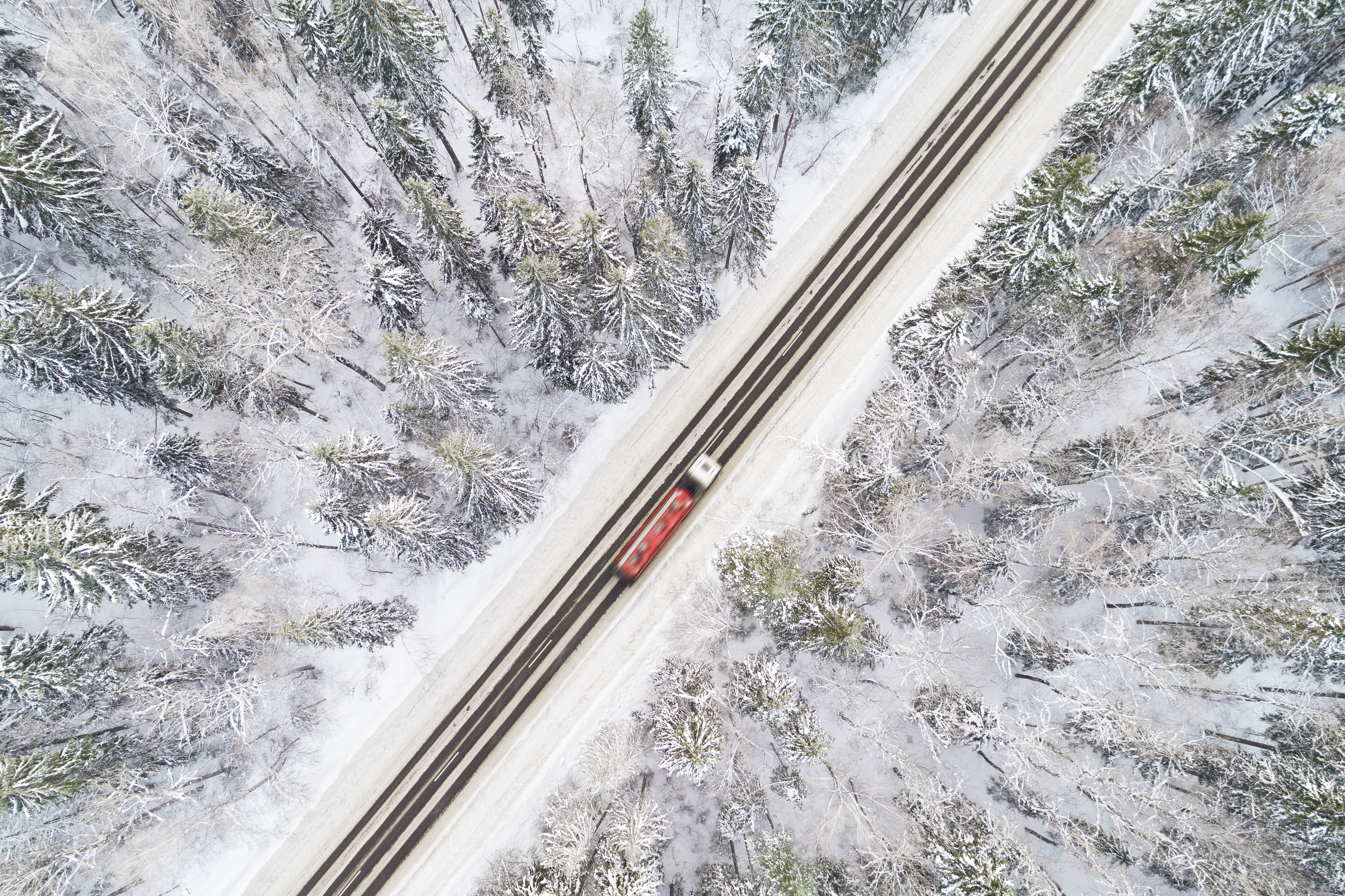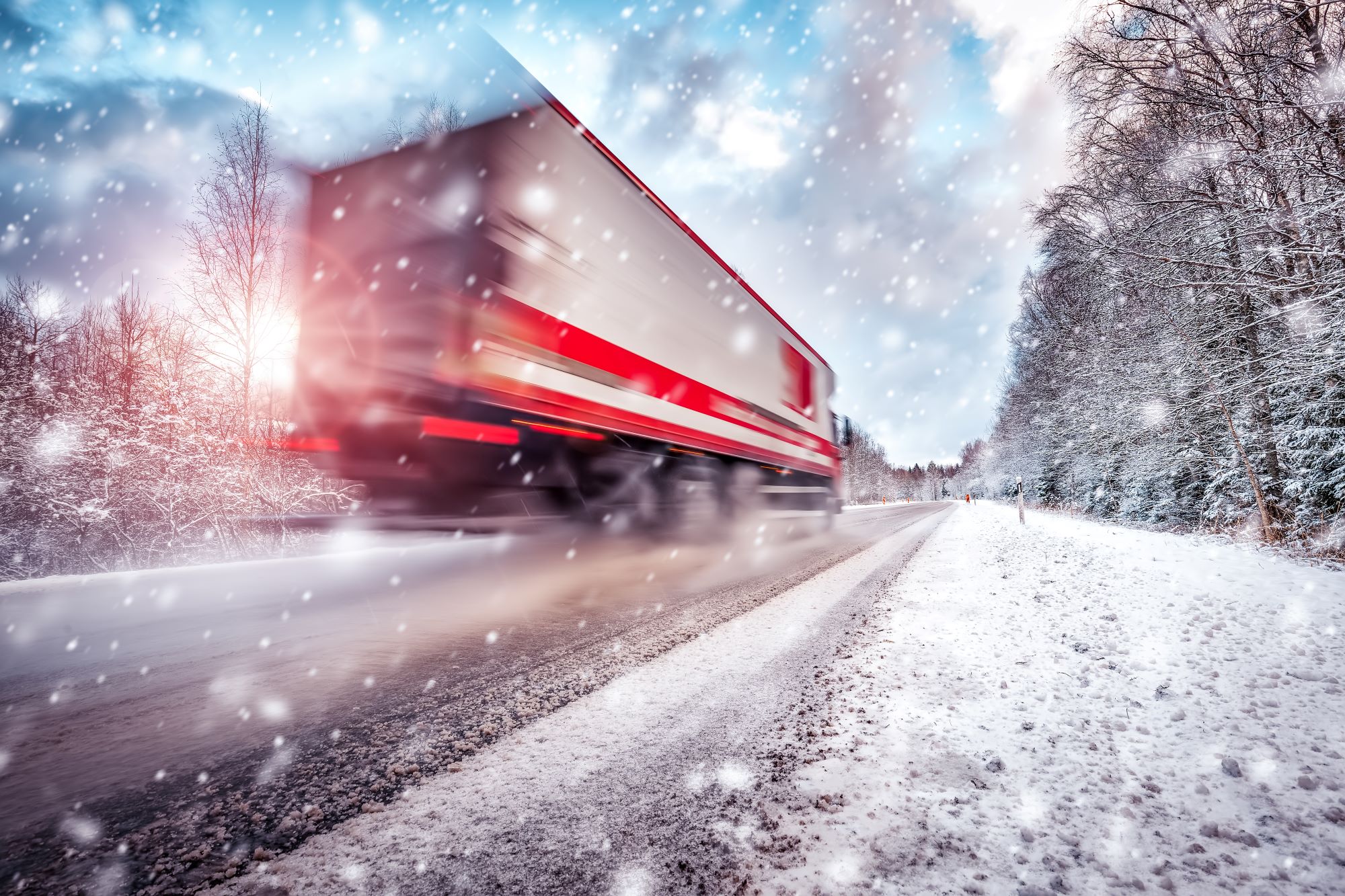
Miranda Blake
Een vrachtwagenchauffeursgids voor de winter in Europa
Gemaakt: 16-10-2024
•
Bijgewerkt: 03-03-2026
Vrachtwagenchauffeurs worden in de koudere seizoenen geconfronteerd met unieke uitdagingen en verantwoordelijkheden. Er is een toename van ernstige verkeersongevallen met 33% van de verzekeringsclaims in deze periode wordt als ernstig beschouwd.
En dus is voorbereiding cruciaal. Hier laten we zien hoe vrachtwagenchauffeurs deze winter zowel op de weg als in hun cabine veilig kunnen blijven.
Navigeren door stormachtige omstandigheden
Het is belangrijk om langzaam te rijden en een veilige afstand tot andere voertuigen te bewaren - vooral in overstroomde gebieden. Je moet je truck in een lage versnelling zetten en je motor op toeren houden.
De volgende tips helpen ook bij het rijden in stormachtig weer.
- Als je op het water de controle verliest, rem dan af door je voet van het gaspedaal te halen - probeer niet plotseling te remmen of te sturen.
- Hogere voertuigen zijn kwetsbaarder bij hevige wind - zorg ervoor dat je het stuur stevig vasthoudt en vermijd bruggen waar mogelijk.
- Rijd met de schuifzeilen open als je truck leeg is. Op die manier is er minder om in de wind te vangen.
Sneeuw en ijs beheren
Bij ijs en sneeuw moet je ook minder snel rijden en de nodige afstand bewaren tot de voorligger. Het wordt zelfs aanbevolen om de remafstand te vergroten tot 10 keer de normale hoeveelheid - het kan echter moeilijk zijn om dit in te schatten. Uit een onderzoek van Admiral bleek dat ijzel 10% van de ongevallen in de winter veroorzaakt. Je kunt zien of je op ijzel rijdt als de weg er nat uitziet, maar er geen spray van andere voertuigen komt.
Andere tips om je te helpen bij het rijden in de sneeuw zijn regelmatige inspecties van je truck en ervoor zorgen dat je alle benodigde apparatuur bij je hebt voor je reis, zoals startkabels en ontdooigereedschap. Zorg er ook altijd voor dat je weet in welke versnelling je moet rijden, want dit kan voorkomen dat je de controle over je truck verliest. Rijd op vlakke wegen in de hoogst mogelijke versnelling. Gebruik bij afdalingen de motorrem en rij in een lage versnelling. Om wielspin te voorkomen, gebruik je bij het wegrijden een hogere versnelling - dit geeft je de tractie die je nodig hebt om het voertuig te verplaatsen.

Zichtbaarheid garanderen
Met gevaarlijke snelwegen en externe factoren die een negatieve invloed hebben op zicht en vrachtwagenongevallen veroorzaken, is zicht cruciaal in alle weersomstandigheden, vooral wanneer het kouder is. Zorg er dus voor dat je je voorruit controleert op barsten of barsten, want die kunnen zich sneller verspreiden in de koudere maanden.
Daarnaast wil je de beste zichtbaarheid voor je lichten, kentekenplaat en voorruit. Naast het verwijderen van sneeuw of vuil is het verstandig om je auto regelmatig te wassen om te voorkomen dat er zich strooizout ophoopt (dit veroorzaakt corrosie).
Als het zicht slecht is en de omstandigheden verraderlijk worden, kun je het beste van de weg afgaan en uitrusten bij de dichtstbijzijnde truckstop. Als je uiteindelijk je [rij-uren] moet overschrijden (https://snapacc.com/newsroom/discover-the-new-drivers-hours-rules/), dan kun je gebruikmaken van een speciale dispensatie voor chauffeurs die vastzitten in unieke omstandigheden zoals extreme weersomstandigheden.
Profieldiepte van banden beoordelen
Lage temperaturen kunnen ook van invloed zijn op de functionaliteit van je banden, omdat ze kunnen leiden tot een lagere luchtdruk. En versleten banden vergroten helaas je remafstand en verminderen je stabiliteit op nat en beijzeld wegdek.
Daarom is het een goed idee om de profieldiepte te controleren vóór elke reis in stormachtige en andere zware omstandigheden - zo weet je wanneer je eventuele problemen moet aanpakken.
Volg de winterbandenvoorschriften
Het is ook belangrijk om op de hoogte te zijn van de verschillende winterbandenvoorschriften. Sommige landen verplichten bestuurders om zandzakken en schoppen bij zich te hebben, terwijl sneeuwkettingen in andere landen verplicht zijn. Continental heeft een eenvoudige gids voor de winterbandenvoorschriften samengesteld voor het VK en Europa.
Vanaf 1 november zijn winterbanden verplicht:
- Oostenrijk
- Tsjechië
- Finland
- Frankrijk
- Litouwen
- Servië
In andere landen zijn ze later in de maand of in december verplicht of zijn ze afhankelijk van de weersomstandigheden. Wat spijkerbanden betreft: hoewel ze zijn toegestaan in de onderstaande landen, zijn er strikte regels voor. Het is het beste om de regels voor elk land te controleren voordat je op reis gaat.
- Oostenrijk
- Wit-Rusland
- Denemarken
- Estland
- Finland
- Frankrijk
- Groot-Brittannië
- Letland
- Liechtenstein
- Litouwen
- Noorwegen
- Spanje
- Zweden
- Zwitserland
- Turkije
- Oekraïne
Relevante benodigdheden meenemen
Je moet ook nadenken over hoe je voor jezelf kunt zorgen in de winter. Dit klinkt voor de hand liggend, maar zorg ervoor dat je toegang hebt tot voldoende eten en drinken. Omdat er tijdens de koudere seizoenen een grotere kans is op wegafsluitingen, kun je niet altijd bij een truckstop terecht. Kom voorbereid met snack- of maaltijdopties, samen met idealiter een warme drank in een veldfles.
Vooral als je niet bij een rustplaats kunt komen, zorg er dan voor dat je warm kunt blijven. Neem bijvoorbeeld oplaadbare verwarmingselementen mee. Zorg er ook voor dat je altijd warme en reservekleding bij de hand hebt; dit is vooral handig als kledingstukken koud en nat worden door taken als het verwijderen van sneeuw van je voorruit.
In het ideale geval heb je een winteroverlevingspakket met onder andere eten, drinken, een draagbare telefoonoplader, een zaklamp, dekens, een veiligheidsvest, een schep en duurzame wandelschoenen.
Gegarandeerde toegang tot stopplaatsen met intruck
Hoewel je het weer niet in de hand hebt, kun je jezelf en anderen op de weg wel beschermen. Dit betekent ook dat je zo snel mogelijk een veilige parkeerplaats moet vinden. Onze intruck app of kaartenpagina geeft je informatie over dienstverleners in de buurt, samen met informatie over de faciliteiten die elke dienstverlener biedt.
Je kunt de intruck app vandaag nog downloaden door op [deze link] te klikken (https://intruckapp.com/download/).


